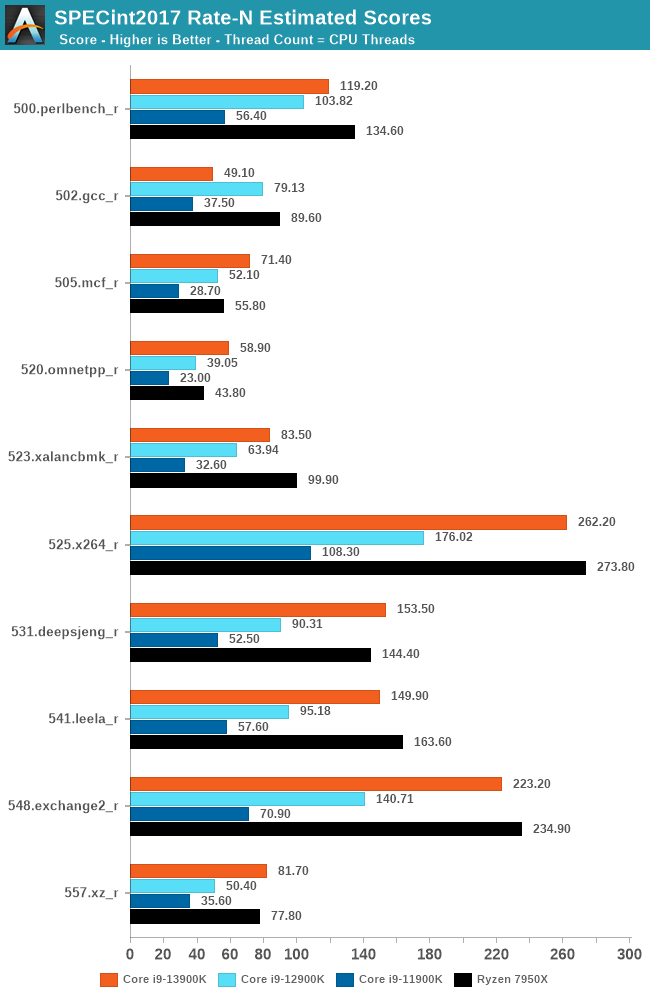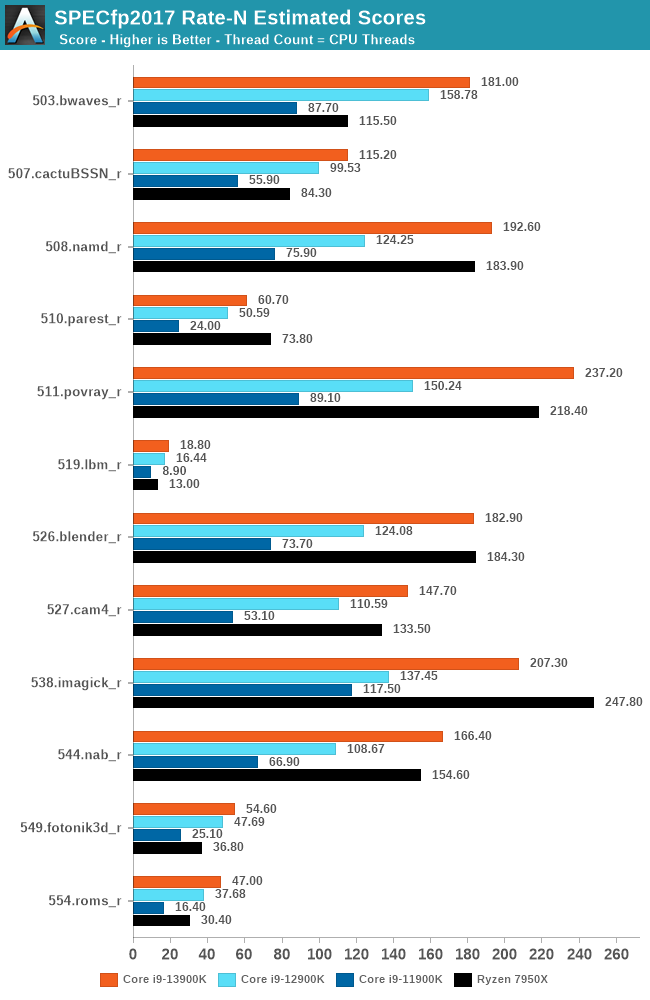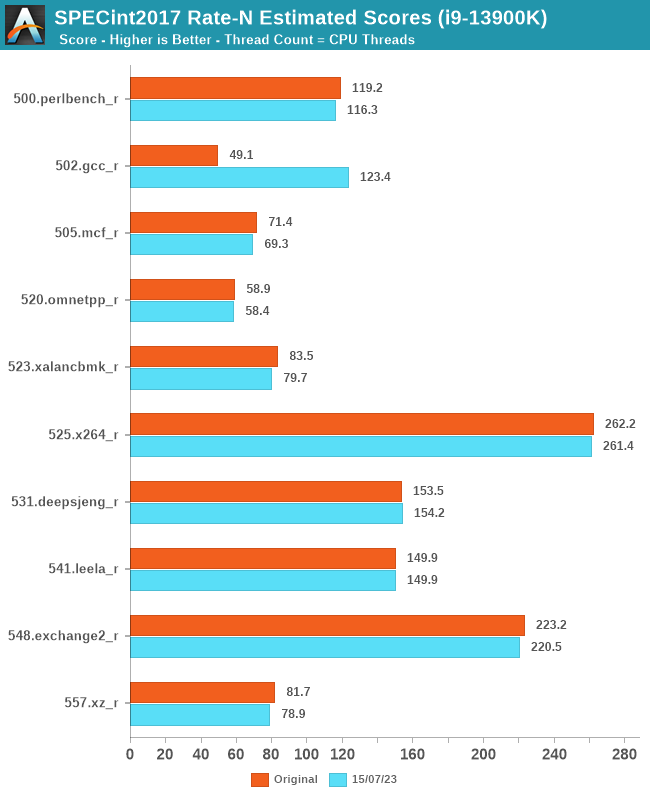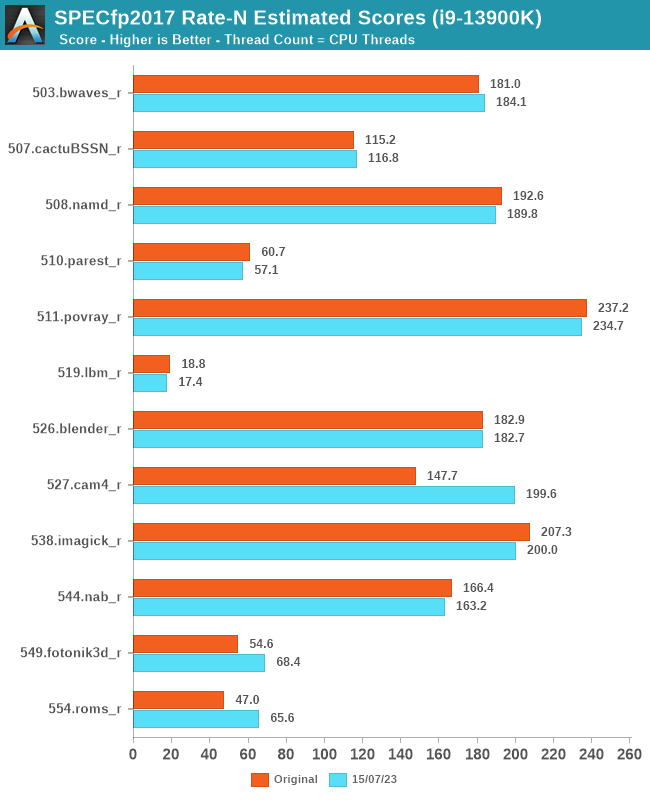Intel Core i9-13900K and i5-13600K Review: Raptor Lake Brings More Bite
by Gavin Bonshor on October 20, 2022 9:00 AM ESTSPEC2017 Multi-Threaded Results
Single-threaded performance is only one element in regard to performance on a multi-core processor, and it's time to look at multi-threaded performance in SPEC2017. Although things in the single-threaded SPEC2017 testing showed that both Zen 4 and Raptor Lake were consistently at loggerheads, let's look at data in the Rate-N multi-threaded section.

Looking at the data in our first part of SPEC2017 (int) nT testing, we're seeing similar trade-offs between Raptor Lake (13th Gen) and Zen 4 (Ryzen 7000) platforms. While Raptor Lake won in the 500.perlbench_r single-threaded test, Zen 4 has the lead by around 13% in multi-threaded performance, despite the Core i9-13900K having eight more physical cores (albeit efficiency cores).
One stand-out part of our SPECint2017 multi-threaded testing is just how far ahead the Core i9-13900K is ahead of the previous Core i9-12900K in multi-threaded tests. This comes thanks to more cores (2x the E-cores), and higher turbo frequencies. For example, in the 525.x264_r test, the Core i9-13900K is nearly 50% better than the i9-12900K; the only part where Raptor Lake failed to outperform Alder Lake was in the 502.gc_r test.

Moving onto the second half of our SPEC2017 multi-threaded results (Floating Point), the Core i9-13900K really does show itself to be a formidable force compared to Zen 4. In the majority of SPECfp2017 tests, the Core i9-13900K is ahead in multi-threaded performance. The improvements in overall performance from Rocket Lake (11th Gen) to Alder Lake were decent, but the improvement from Rocket Lake last year in Q1 2021 to Raptor Lake today – a more useful metric for the usual 2-4 year hardware upgrade cycle – is very impressive indeed.
Summarizing the SPEC2017 multi-threaded results, in some areas Zen 4 is the winner, some areas Raptor Lake (Raptor Cove + Gracemont) is the winner. It is incredibly close in quite a few of the tests, and without sounding negative on the Zen 4 architecture here, but Intel has done a very good job bridging that initial gap to make things competitive against AMD's best.
Update 18/07/23
Following on from our initial results in our SPECint2017 Rate multi-threaded testing of the Core i9-13900K, we wanted to investigate the 502.gcc_r result, which we believed to be an anomaly of sorts. We observed a score of 49.1 on the Core i9-13900K, which, compared to the previous generation Core i9-12900K, is a regression in performance; the result was around 37% lower than the previous generation.
To investigate further, we've re-tested the Core i9-13900K using SPEC2017 Rate to identify any issues and to see if we could further replicate the issue or, at the very least, provide a more up-to-date list of results.

Looking at our updated SPECin2017 results, we are comparing the original Core i9-13900K data to the new data for comparative purposes. Although the results are very similar in many cases, we can see some slight regression in a few results, which could be attributed to various factors, including Windows 11's scheduler, power budget, or just general variance in running.
The biggest highlight of our re-test is the 502.gcc_r result, which seems to be an anomaly for the original run. We've run SPEC2017 numerous times to confirm that the above results are exactly where they should be.

Focusing on our latest results for SPECfp2017 Rate N, we can see a similar story, with very similar results in multi-threaded SPEC2017 performance as with our original testing. In fact, a couple of the results yielded slightly higher results, which could be simply down to scheduler maturity, OS-related improvements including the scheduler, or overall firmware maturity. The results include 527.cam4_r, 549.fotonik3d_r, and 554.roms_r, which show better gains in our latest testing, especially compared to the Core i9-12900K, which this chip replaced in the market.
The biggest takeaway from our re-testing is the updated SPECint2017 Rate-N result for 502.gcc_r, which shows that our original results were nothing more than an anomaly, and we've been unable to replicate the issue.
Update: 07/22/23
We are aware of potential issues with memory capacity, and as such, we are re-running the Core i9-13900K with higher capacity DDR5 memory at JEDEC settings relevant to the platform. We have done a run with 64 GB instead of the regular 32 GB, which with the Core i9-13900K is 2 GB per thread (2 GB x 32 = 64 GB). Looking at preliminary results, we aren't seeing any major variances in these results.










169 Comments
View All Comments
shabby - Thursday, October 20, 2022 - link
http://uploads.disquscdn.com/images/ce6075096ed8d9...Sometimes you need to go elsewhere to get what you need. Reply
shabby - Thursday, October 20, 2022 - link
7700x uses 80w less during gaming than 13700k. ReplyCT007 - Sunday, October 23, 2022 - link
7700X is an awesome chip for pure gaming... I don't understand why it has been excluded in so many major benchmarks I've scene lately. Replytitaniumrock - Thursday, October 20, 2022 - link
her is a link for you https://www.youtube.com/watch?v=H4Bm0Wr6OEQ Replym53 - Friday, October 21, 2022 - link
For gaming: 13900k is more effecient than Ryzen per Igor’s lab’s test. Here’s what he has to say:“From a purely statistical point of view, it is a clear victory of the Core i9-13900K against the Ryzen 9 7950X in gaming, although life does not only consist of pure gaming. The Core i9-13900K often wins in the workstation and creation field, but not always. And even if it is even a tad more efficient at gaming than AMD’s Ryzen 9 7950X counterpart…”
Link: https://www.igorslab.de/en/intel-core-i9-13900k-an...
For idle: Given below is a comprehensive review for Alder Lake vs Zen3 done by Tech notice. He found Ryzen to use almost 4x during idle. He also tested some realistic day to day use cases where 12th gen was more efficient than Ryzen. I expect it to continue with 13th gen vs zen4.
https://youtu.be/4F2z3F64o94 Reply
t.s - Friday, October 21, 2022 - link
Pity there's no from the wall numbers. ReplyWrs - Friday, October 21, 2022 - link
Socket power is a fair comparison - both sides have comparable socket PCIe lanes and chipset lanes. When using wall numbers for Intel vs. AMD you introduce motherboard and component variability. Even using the same CPU you'll find motherboards can vary by 10-20W at load due to VRM quality differences. Replyt.s - Saturday, October 22, 2022 - link
yep, you're right. I just curious about the consumption from the wall. Replycatavalon21 - Sunday, October 23, 2022 - link
CPU reviews used to. https://www.anandtech.com/bench/CPU-2020/2734 Replymeacupla - Thursday, October 20, 2022 - link
Intel is really pushing those e-cores. Do they really help with keeping power draw to a minimum while doing low power tasks? Reply